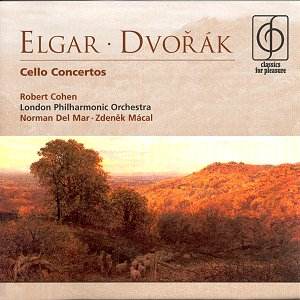Robert Cohen made a big impression when his career
was launched during the 1970s, and these two recordings from 1980-81
came at a time when a major international career was developing for
him. If that never quite happened (we don't quite bracket him with Rostropovich);
he is still a fine cellist to this day, capable of bringing insights
into all the major works of the instrument's repertory.
That is certainly the case here, in this pair of recordings,
of perhaps the two greatest concertos for the cello. The London Philharmonic
Orchestra plays well in each work, with a conductor for each who was
a specialist in his field. The recordings were made in venues whose
acoustics suit orchestral music supremely well, and they still sound
splendid twenty years later.
Of the two performances, the Elgar comes across more
satisfactorily than the Dvorák. Although the opening cadenza
can sound bigger-boned than Cohen provides, the tone is pleasing, and
so too is the balance against and with the orchestra as the music proceeds.
There is a most sensitive attention to detail, and the relationship
between soloist and conductor is well thought out. This is an interpretation
which is of the highest order.
The Dvorák performance is good too, but does
not to my mind possess the sweeping intensity this great work requires
of an interpretation. The playing is good, from everyone involved, and
the recording sounds well. But in the first movement especially the
ebb and flow is not powerful enough in its quasi-symphonic dimensions.
This has longer term implications, with the result that the emotional
drive of the music is not as overwhelming as it can be when the later
stages are reached, and the poignant music relating to the death of
the composer's first love, Josefina Cermakova, is heard just before
the final drive.
This remains a performance to reckon with, all the
same, and at bargain price it is nothing if not competitive.
Terry Barfoot


